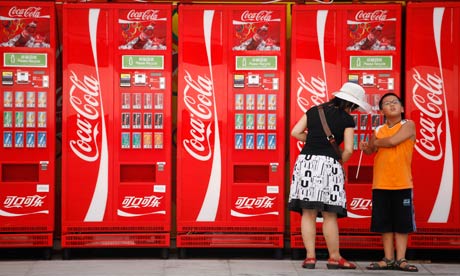
Coca-Cola came out on Monday night. The world's most valuable brand, broadcast an advert suggesting they, possibly, have a problem with sugar. In a certain first in the history of food and beverage advertising, it mentioned the o-word - obesity. This comes 126 years after Coca-Cola's invention, many of them spent in denial of the most damning medical evidence about the "right one's" failings over a number of damaging and addictive substances - caffeine, sugar, teeth-rotting acids and cocaine.
It's not quite the Coca-Cola polar bears, but the ad, broadcast on US cable networks, is showing impressive reach. By Wednesday, David Cameron was describing telling the House of Commons "how big the challenge" is of stopping his own children drinking too much Coca-Cola.
Just as in 1903 the company had to admit, after a newspaper exposé, that its drink contained significant amounts of cocaine, its new TV ad confronts the fact that it contains a lot (nine spoonfuls a can) of sugar. "There's an important conversation going on about obesity out there", said Coca-Cola North America's Stuart Kronauge as he launched the ad. "We want to be a part of the conversation."
OK, Stuart – this is what we've been talking about. Sweetened drinks are now the major source of calories in the American diet – and possibly the British diet too. The two-thirds of American adults who are overweight or obese may have been shocked to learn from Coke's advert that "if you eat and drink more calories than you burn off, you'll gain weight" and that sugar in soft drinks might play a part in that. But no scientist is.
In fact, the research now seems to indicate that taking in excessive sugar is more liable to make you fat than consuming fat is. And of course, the massive rise in recent decades of diabetes, heart problems and cancer of the digestive tract have been linked to the huge increase in sugar consumption in the rich world over recent decades. In 1822, Stuart, American adults consumed the amount of sugar contained in one can of soft drink every five days. Now on average every adult consumes that much every seven hours, and one-third are obese.
The advert, soft as it was, is the first shot in a new defensive war. (Coca-Cola's "gift" of $4m to the Worldwide Fund for Nature this week was another). An assault on sugared drinks is coming that will make it look like the new tobacco. New York city has legislated for lower portion sizes for sodas, and France is planning a tax on them.
The British government is always nervous about curbing the freedoms of Big Food corporations. It will not be so tough, despite David Cameron's revelation. After years of discussion (and a bribe to manufacturers in the form of tax incentives) a voluntary "traffic light" scheme will be introduced on food labels later this year. Green, amber or red will indicate how healthy the product is, but there's no recommendation to do the same for drinks. Here's BBC Radio Four's food programme with more trenchant criticism of the scheme.
Most food campaigners and many scientists say that the time when education and advice will suffice has passed. Legislation is needed to curb the damage being done by added sugar. Robert Lustig, professor of paediatrics at the University of California, San Francisco is leading a campaign for a punitive tax: "It [sugar] meets all the criteria for societal intervention that alcohol and tobacco meet," he said last year.
Lustig and his fellow scientists wrote in Nature magazine: "Take, for instance bans on smoking in public places and the use of designated drivers, not to mention airbags in cars and condom dispensers in public bathrooms. These simple measures - which have all been on the battleground of American politics - are now taken for granted as essential tools for our public health and well-being. It's time to turn our attention to sugar."

